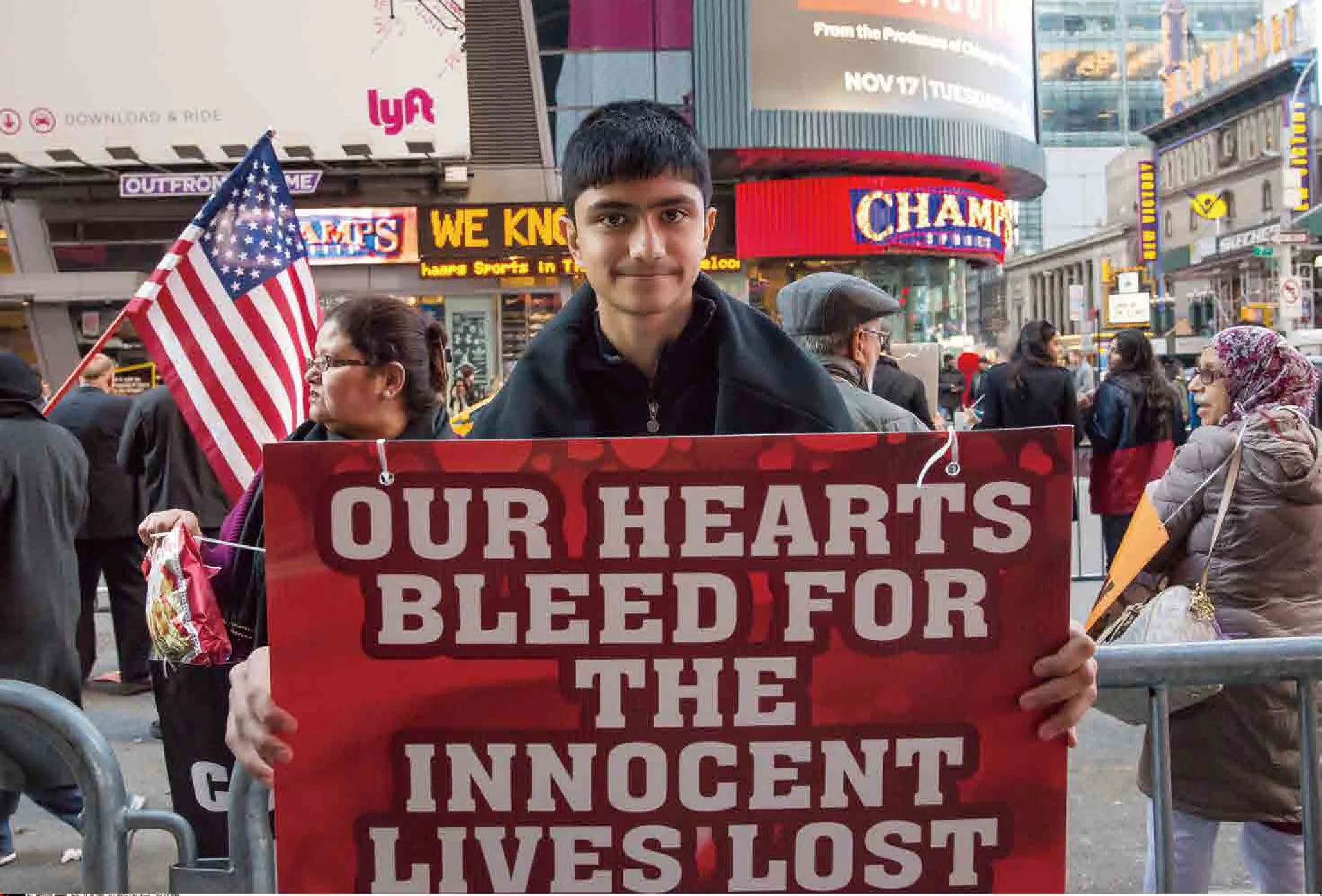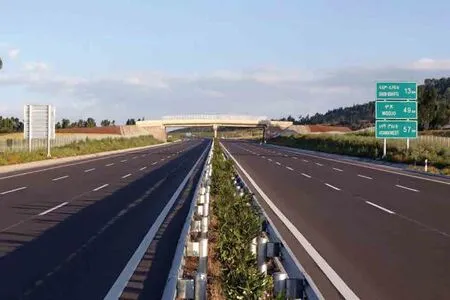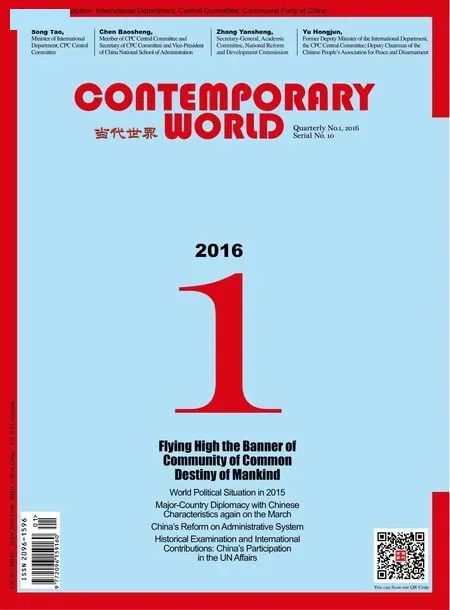10 Global News Events in 2015
2016-04-18PLANNEDBYTHECWEDITORIALDEPARTMENTWRITTENBYZHANGKAI
PLANNED BY THE CW EDITORIAL DEPARTMENT WRITTEN BY ZHANG KAI
10 Global News Events in 2015
PLANNED BY THE CW EDITORIAL DEPARTMENT WRITTEN BY ZHANG KAI
1 IN ALL-ROUND PUSH OF MAJOR-COUNTRY DIPLOMACY WITH CHINESE CHARACTERISTICS, “CHINA ELEMENTS” SHINE IN RESHAPING WORLD ORDER
In the past year, major-country diplomacy with Chinese characteristics has come to the fore in an all-round way in the country’s interaction with the rest of the world, featuring aggressiveness, creativeness and innovativeness.A rising China has not only put forward new diplomatic notions such as community of common destiny of mankind but also, on practical plane, provided the international community with public goods.The comprehensive advancement of the Belt and Road initiative, the establishment of the Asian Infrastructural Investment Bank, the set-up of China-UN Peace and Development Fund and South-South Cooperation Assistance Fund all demonstrate to the world China’s willingness and ability in performing its international duties.Either in creating new international institutions or in putting forward China plans on hotspot issues, a trend is increasingly clear that more and more “China elements” taking place in the new round of reshaping world order.Only a short while ago, the US-led Western countries asked a China on the rise to take up more international responsibilities.However when China does take up corresponding responsibilities, those with vested-interest in the international system are full of grievances alleging that China is up to challenging the existing international order.Yet, the fact is just the opposite.Time and again, China has stressed that the post-war international order with the United Nations at its core should be unyieldingly upheld.Even in creating new institutions, presenting new plans and implementing new initiatives, China is mindful of improving rather than subverting it.In reshaping the world order, it is necessary both for China to keep to the road of peaceful development and for those with vested interest to set aside prejudice and be inclusive of the rise of China.

Russian soldiers dressed in period Red Army uniforms march through Moscow’s Red Square in honor of the 1941 parade, November 7, 2015.
2 UNDERCURRENTS IN COMMEMORATING THE 70TH ANNIVERSARY OF THE VICTORY OF WORLD ANTI-FASCIST WAR IN VARIOUS COUNTRIES
The year of 2015 marks the 70th anniversary of the victory of the World Anti-Fascist War, and both Russia and China that had made great sacrifice and contributions to the victory have respectively held grand military parades.European countries such as the UK, France and Germany have marked the important historical moment in various forms like standing in silent tribute, conducting parades and holding concerts.The United Nations, itself being an important result of the Second World War has also conducted a series of commemorative activities.After seventy years of the victory, those countries that had been trampled onby the war in every possible way commemoratethe end of it, which, though different in forms, is for the same purpose, i.e.to preserve peace and the post-war international order that are not easy to come by.As German Chancellor Merkel calls for, “the crimes of the Nazi should not be forgotten”.However, Japan, a country that had also committed monstrous crimes in the war, is evasive in reflecting on history.Its Prime Minister has taken the lead in paying tribute to the Yasukuni shrine whereas its Diet has steamrolled the new National Security Act against the will of the Japanese people, sufficing to show that the specter of Fascism still haunts Japan.At such a juncture, the US-led Western countries are disapprobative of Russia’s commemorative activities and even regard China’s V-Day parade as “showing the muscle”, all of which exposes the serious contradictions and antagonism still existing between the victors of yesterday.There are increasingly obvious undercurrents under the generally peaceful order.
3 PUSHING MULTIPLE TRADE AGREEMENTS AT THE SAME TIME, MAJORCOUNTRY CONTEST IMPACTS ASIAN-PACIFIC ECONOMIC ORDER
On October 5, 2015, as a key component of its “Rebalancing Asia-Pacific” strategy, the US presided over the conclusion of basic agreement of the Trans-Pacific Partnership Agreement (TPP).The “economic NATO”, that excludes China the second largest economy, agrees to free trade, setting unified norms and standards on a wide range of areas like investment and intellectual property rights.Though kept out of the TPP, China has displayed unprecedented proactive attitudes in constructing an open trade system.At bilateral level, it has concluded free trade agreements respectively with the ROK and Australia.At multilateral level in Northeast Asia, it has reactivated China-Japan-ROK Leaders’ Meeting, committing to accelerating the construction of a trilateral free trade area.At multilateral level in Southeast Asia, the negotiations on an updated edition of China-ASEAN free trade area have been concluded.In face of pressures from the conclusion of basic agreement of TPP, the Regional Comprehensive Partnership Agreement (RCEP) with the ASEAN at its core has quickened the pace of negotiations with China playing an important role in the process.Besides, the construction of Asia-Pacific freetrade area under the framework of APEC has moved on in good order.The multiple processes of the TPP, the RCEP, the China-Japan-ROK free trade area and the Asia-Pacific free area progressing at the same time and China-US competition and cooperation behind it reflect a profound readjustment facing the Asian-Pacific economic order.
4 MIX OF LASTING CONFLICTS AND MAJORPOWER CONTESTRESULTING IN FRAGMENTATION OF THEMIDDLE EAST ORDER

Sousse, the famous tourist city of Tunisia suffered armed attacks on June 26, 2015.In this attack, at least 37 people were killed.The picture shows people gathered and condemned the attacks the next day.
Looking back in 2015, nowhere in the world other than the chaos in the Middle East can attract more attention of the international public opinion.Early in the year, the Houthi rebel group in Yemen challenged the government forces, resulting in “resolute storm” airstrikes the coalition of Arab countries led by Saudi Arabia.And then, following the footstep of the US, other powers from beyond the region such as Russian, French and German have sent troops to Syria to strike on the ISIS.Then, Turkey shot down Russian war-plane by borrowing the power of NATOleading to continued strained relations between the two countries.In addition, the Israel-Palestine conflict seems never to end.As old issues linger on without solutionand new ones continue to crop up, all kinds of warfare and conflicts have fragmented an already fragile Middle East order in the past year.Of course, terrorism and secretarial strives are important attributes to the chaos there, but the major-power contests there should not be overlooked.The Saudi-Iran contest is behind the civil strives in Yemen.The US-Russia contradiction and contest are behind the Syrian issue as well as newly emerging direct confrontation between Russia and Turkey.It may be the only solution to civil conflicts in Yemen and Syria or conflicts between nations like Israel and Palestine for concerned parties to return to negotiation table.However, unfortunately the US, a stake holder of the collapsing Middle East order, has yet to play a role of promoting peace talks with positive energy.
5 IMPACTED BY REFUGEE CRISIS, EUROPEAN COUNTRIES HARD PUT TO ACCEPT OR DEPORT THEM
In 2015, already troubled by debt crises and meddling through, an entangled Europe found itself under the impact of surging tide of refugees, mainly from war havocked countries such as Syria, Iraq and Afghanistan.They take the sea route or land route to first arrive in marginal European countries and then transfer to more prosperous core European countries.In face of the refugee crisis, a matter of extreme urgency, the EU has taken measures like allotting refugee quotas to member countries and providing African countries concerned with assistance to set up new refugee camps.However, as all this cannot put things right once and for all, the refugee crisis has not only impacted the process of European integration but also resulted in the fact that the political ecology in some of the European countries have turned more to the right, the UK threatening to “exit the EU”.Although European countries face problems of aging and lacking labor force, when a large number of refugees swarm in, they tend to close the door on most of the refugees for considerations of economic interest and social order while accepting some of them out of humanitarian aspiration and practical reason of filling population shortfall.According to the International Organization for Migration, over one million migrants have entered Europe in 2015.Under the situation, it is a great challenge for many European countries to strike a balance between accepting refugees and avoiding criticisms of conservative forces at home and international public opinions.

Slovenia’s riot police are trying to stop refugees from entering the country at the border crossing near the Croatian village of Harmica, September 19, 2015.
6 WITH CONCLUSION OF COMPREHENSIVE AGREEMENT ON IRANIAN NUCLEAR PROGRAM, WHITHER US-IRAN RELATIONS BEING UNDER TEST
After many years of arduous talks, Iran and P5+1 (the US, the UK, France, Russia and China plus Germany) reached on July 14, 2015 the Joint Comprehensive Plan of Action (JCPOA), resulting in eventual solution of the international dispute lasting for more than a decade through political means.The agreement on Iranian nuclear program is a result of political compromise among the concerned parties.For Iran, it is conducive to improving people’s livelihood at home and turning the tables of economic difficulties due to long-lasting sanctions.For the US, it helps realizerapprochement with Iran so that it can concentrate on striking the ISIS and gradually reconstructing a very confused Middle East order.Not only is the agreement an important diplomatic legacy of the Obama Administration but also it has turned a new page on US-Iran relations.Even so, it remains to be tested by time if the agreement on Iranian nuclear program can be fully implemented.After all, Israel is quite unhappy with it and tries to obstruct it in every possible way.The Republicans think nothing of the White House.The deep-seated detestation of the US by the conservative forces in Iran has not decreased at all.All this determines that it will be very difficult for the US and Iran, two key countries to the Iranian nuclear agreement, to improve their relationship.Furthermore, the US will hold the general elections in 2016, which gives rise to quite a few uncertainties if US-Iran relations after turning the new page can keep going.

The Iranian Nuclear Agreement has greatly stimulated the Israeli security nerves.Israel said it would use all efforts to stop the agreement passed in the United States Congress.The picture shows Israeli Prime Minister Benjamin Netanyahu (former) delivered a speech at the United States Congress in Washington on March 3, 2015.
7 AFTER RESTORING DIPLOMATIC TIES, DIFFERENCES ON SANCTIONS KEEPING THE US AND CUBA FROM GETTING WARM TO ONE ANOTHER
On July 1, 2015, the US and Cuba announced a historic decision of formally reestablishing diplomatic relations, thawing the icebound ties between the two countries for over half a century and starting the process of normalization of relations.Since taking office, the Obama Administration has been active in relaxing relations with Cuba.From the realization of leaders meeting to removing Cuba from the list of countries “sponsoring terrorism” and to “burying the hatchet”with Cuba by formally restoring diplomatic ties, this gradual political process becomes an important diplomatic legacy of the Obama Administration.To a large degree, readjustment of policy by the Obama Administration attributes to the eventual failure of US sanctions on Cuba for more than fifty years whereas Cuban sustainability of long-term pressures of the US attributes to the solidarity of Latin American countries.The Latin American countries have given full play to multilateral platforms such as leadership meetings of Organization of American Statesand the General Assembly of the United Nations in condemning the US and demanding it to give up economic embargo and sanctions on Cuba.The solidarity of Latin American countries has played an important role in the restoration of US-Cuba relations.In spite of the progress, the US has not removed sanctions on Cuba comprehensively to date.There are quite a few people in the US harboring hostility towards the Communist regime in Cuba.Differences in political system and ideology between the two countries remain.All the above are “stumbling blocks” to further relaxation of the bilateral relationship.
8 AS EXTREMISM, VIOLENCE AND TERRORISM WRECK HAVOCS AROUND THE GLOBE, THE CLASH OF CIVILIZATIONS GAINS AN UPPER HAND
At the beginning of 2015 in Paris, France, the weekly Charlie Hebdo was attacked by terrorism on January 7, killing 10 journalists and two police officers.And again in Paris in November, the extremist organization of the ISIS launched a series of shooting attacks, taking over a hundred innocent lives.All at once, Paris has in the teeth of storm of press coverage, attracting extensive attention of the international community.However, terrorism does not “show special preference” to Paris but rather increases exponentially in a number of countries in the world.Over the year, Syria, Iraq, Afghanistan, Pakistan, Kenyaand Mali have succumbed by different degrees to terrorist attacks.Since the terrorist attacks eitherare conducted by Muslim extremists or happen in countries of Islamic faith, a radical leader of opinion has come to the fore in the US-led West that it is Islamism that nurtures terrorism, the production of which often coincides with the theory of “clash of civilizations”.In fact, terrorism largely arises from poverty, inequality and conflicts rather than from a form of religion or civilization.In essence, terrorism is a political issue and a development issue but it cannot and should not be taken for a religious issue.Therefore, cracking down on terrorism cannot and should not evolve into discrimination against a religion or a civilization.It is the right approach to this end to consider how to reconstruct the fragmented order of concerned countries for sustained economic development.

A hundred American Muslims holds a demonstration in New York City’s Times Square, mourning the victims of terrorist attacks in Paris, November 21, 2015.
9 AT UN CLIMATE CHANGE CONFERENCE, PARIS AGREEMENT MARKS A HISTORIC TURNING POINT
On December 12, 2015, a new global climate agreement, the Paris Agreement, was finally reached through arduous negotiations between close to 200 contracting parties to the United Nations Framework Convention on Climate Change (UNFCCC).The agreement is a key breakthrough in the area of global governance on climate change after the Kyoto Protocol in 1997.It provides global post-2020 action on climate change with legally binding institutional arrangements, becoming a historic turning point for climate change.Contracting parties had conducted a long contest centering on key elements such as “long-term objective”, “climate finance”, “mitigation”, “transparency” and “adaptation” before dust settled in the Paris Agreement.Though the new climate agreement is less than perfect, it does send positive signals of common response of mankind to climate change in building a low carbon society, displaying a sense of “community of common destiny” in the area of climate change.“An endeavor is ten percent in program and 90 percent in implementation.” Of course, the Paris Agreement is important, but it is more important than the agreement itself for contracting parties to turn political commitment into actual action.Taking into account the fact in history that the developed countries have made more commitment than taken actual action in providing the developing countries with financing and transfer of technology in climate area, in order to make the Paris Agreement effective in responding to climate change in the future, it is necessary for the developed countries to earnestly honor their commitment.
10 CHAIN REACTION OF AFRICANSUMMIT DIPLOMACY BEGINS A NEW NORMAL OF RACE BETWEENMAJORCOUNTRIES

The picture shows the highway from Addis Ababa to Adama built by China Communications Construction Company Ltd.on November 3, 2013.This is the first highway in Ethiopian history.
Development of Africa is on the upgrade, a fact attested by frequent summits there in the past year.In 2015, African countries have held summit meetings with countries and international organizations such as India, the EU and China, discussing bilateral and multilateral cooperation.At the Europe-Africa Summit, the EU offered Africaan emergency Trust Fund of 1.8 billion Euros in exchange for African countries’ support for the EU policy of repatriating immigrants.At the China-Africa Summit, China pledged US$ 60 billion in support of Africa’s industrialization and modernization.At the India-Africa Summit, India offered a concessionary loan of US$ 7.4 billion in support of Indian enterprises “to get into” Africa.“Total gold” has continued to be spread to the continent waiting to be developed, which fully indicates that Africa, with a huge population dividend and rich endowment of natural resources, is highly favored by the international community.Major countries are racing against one another to get to Africa, throwing light on the value of this continent.While an “aging” Europe is seeking help from its erstwhile colonies, major developing countries provide Africa with various forms of assistance under the framework of South-South cooperation also in search of business opportunities.For Africa, not only can summit diplomacy bring about huge economic benefit but also, more important, through conducting a balanced diplomacy with major powers it gives Africa more leverage in the process of bargaining so as to maximize its own interest.In this sense, summit diplomacy, being increasingly institutionalized, is of great service to Africa.
杂志排行
Contemporary World的其它文章
- 黄福霆/作品欣赏
- China’s Belt and Road Initiative Helps to Promote Sri Lanka Economic Development: An Interview with Special Advisor to PM of Sri Lanka Mr.A Aala
- 10 Global News Figures in 2015
- The Rising Power of China in Africa and its Implications on African International Relations in the 21st Century
- Resumption of China-Japan-South Korea Trilateral Summit and the Future of Trilateral Cooperation
- China-US Relations: Status Quo and Problems Existed
